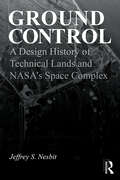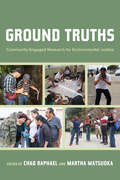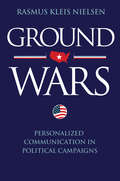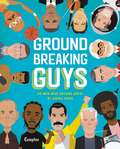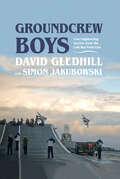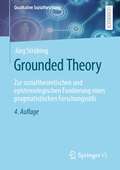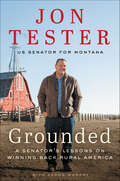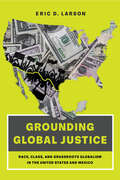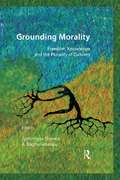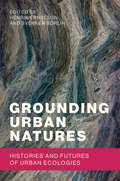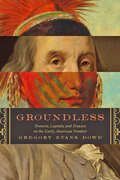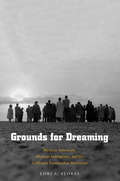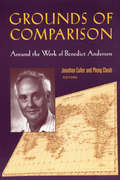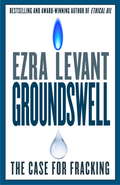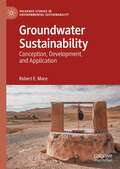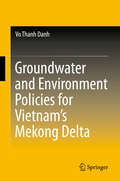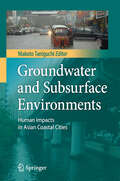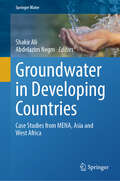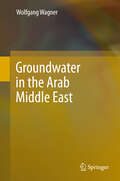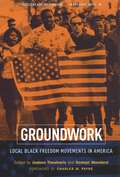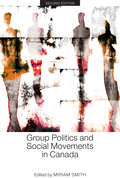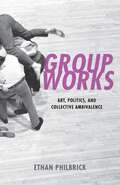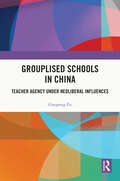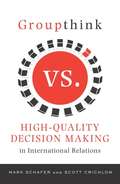- Table View
- List View
Ground Control: A Design History of Technical Lands and NASA’s Space Complex
by Jeffrey S. NesbitGround Control: A Design History of Technical Lands and NASA’s Space Complex explores the infrastructural history of the United States rocket launch complex. Working primarily between 1950, the year of the first rocket launch at Cape Canaveral, to 1969, the Apollo moon landing, the book highlights the evolution of its overlooked architecture and infrastructural landscape in parallel to US aerospace history. The cases outlined in this book survey the varying architectural histories and aesthetic motivations that helped produce America’s public image of early space exploration. The built environment of the U.S. space complex shows how its expanded infrastructural landscape tended to align with national Cold War politics and themes found in the age of modernity. Examples across often inaccessible sites of remote landscape help explain the contingent histories and deep association of an American aesthetic, land-use, and ultimately a form of nation-building practices. Ground Control offers a new way of understanding how technological uses of place-based science were designed and constructed in support of both industrial and military activities in postwar America. This book will be of interest to researchers, scholars, students, and anyone with a general interest in the history of American infrastructure, land use, and space exploration.
Ground Truths: Community-Engaged Research for Environmental Justice
by Chad Raphael and Martha MatsuokaA free ebook version of this title is available through Luminos, University of California Press’s Open Access publishing program. Visit www.luminosoa.org to learn more. This is the first book devoted entirely to summarizing the body of community-engaged research on environmental justice, how we can conduct more of it, and how we can do it better. It shows how community-engaged research makes unique contributions to environmental justice for Black, Indigenous, people of color, and low-income communities by centering local knowledge, building truth from the ground up, producing actionable data that can influence decisions, and transforming researchers’ relationships to communities for equity and mutual benefit. The book offers a critical synthesis of relevant research in many fields, outlines the main steps in conducting community-engaged research, evaluates the major research methods used, suggests new directions, and addresses overcoming institutional barriers to scholarship in academia. The coauthors employ an original framework that shows how community-engaged research and environmental justice align, which links research on the many topics treated in the chapters—from public health, urban planning, and conservation to law and policy, community economic development, and food justice and sovereignty.
Ground Wars: Personalized Communication in Political Campaigns
by Rasmus Kleis NielsenPolitical campaigns today are won or lost in the so-called ground war--the strategic deployment of teams of staffers, volunteers, and paid part-timers who work the phones and canvass block by block, house by house, voter by voter. Ground Wars provides an in-depth ethnographic portrait of two such campaigns, New Jersey Democrat Linda Stender's and that of Democratic Congressman Jim Himes of Connecticut, who both ran for Congress in 2008. Rasmus Kleis Nielsen examines how American political operatives use "personalized political communication" to engage with the electorate, and weighs the implications of ground war tactics for how we understand political campaigns and what it means to participate in them. He shows how ground wars are waged using resources well beyond those of a given candidate and their staff. These include allied interest groups and civic associations, party-provided technical infrastructures that utilize large databases with detailed individual-level information for targeting voters, and armies of dedicated volunteers and paid part-timers. Nielsen challenges the notion that political communication in America must be tightly scripted, controlled, and conducted by a select coterie of professionals. Yet he also quashes the romantic idea that canvassing is a purer form of grassroots politics. In today's political ground wars, Nielsen demonstrates, even the most ordinary-seeming volunteer knocking at your door is backed up by high-tech targeting technologies and party expertise. Ground Wars reveals how personalized political communication is profoundly influencing electoral outcomes and transforming American democracy.
Groundbreaking Guys: 40 Men Who Became Great by Doing Good
by Stephanie True Peters Shamel WashingtonAn illustrated book of biographies highlighting the inspiring and innovative qualities of forty very different men throughout history, for fans of Heroes for My Son and Good Night Stories for Rebel Girls.Our history books are full of great men, from inventors to explorers to presidents. But these great men were not always good men. It's time for our role models to change. This book pays tribute to Mr. Rogers, Barack Obama, Hayao Miyazaki, and more: men whose masculinity is grounded in compassion and care. These men have varying worldviews and are accomplished in a range of fields, but they share important commonalities. They served their communities. They treated people with respect. They lifted others up. And they went on to create change, inspire others, and, indeed, do great things--not in spite of their goodness, but because of it.These men's stories will educate, entertain, and encourage the next generation of writers, activists, entrepreneurs, and other leaders of all genders to do better and be better--to be truly groundbreaking.
Groundcrew Boys: True Engineering Stories from the Cold War Front Line
by David Gledhill Simon JakubowskiHave you read stories of ‘derring-do’ from former operational aircrew and been left wondering what went on in the hangars and on the airfields, as those aircraft were serviced and prepared for flight? In this edition of the Boys series, you’ll discover the true stories of life on the flight line, written by those who served. Some of them are humorous, some are thought provoking but for sure the reader will be engrossed. Twenty engineers, some former groundcrew, some engineering officers but including enthusiastic aircraft restorers, recall stories of incidents around the world, about aircraft as diverse as the Phantom, the Shackleton and the Sea Harrier. Although some of the stories reflect on incidents where things went wrong, and are told in a typically ribald manner, the dedication and professionalism of the people who serviced these front-line aircraft could never be in doubt. The men and women of the British armed forces rank amongst the best in the world. It will also be apparent that their love did not end with retirement and many of the groundcrew went on to work for companies designing the next generation of aircraft. Some dedicate their spare time to restoring their former war machines so that future generations will enjoy their heritage. The stories are collated and set in context by aviation author David Gledhill and are illustrated with photographs, many from the groundcrew themselves and previously unpublished. A must for all aficionados of the Boys series.
Grounded Theory: Zur sozialtheoretischen und epistemologischen Fundierung eines pragmatistischen Forschungsstils (Qualitative Sozialforschung)
by Jörg StrübingWenig wurde bislang über die erkenntnistheoretische Fundierung der Grounded Theory in der pragmatischen Sozialphilosophie und die daraus resultierenden Konsequenzen für das Verständnis der methodologischen Konzeption wie der praktischen Verfahren geschrieben. Der Band schließt diese Lücke, indem das Erkenntnismodell, ausgehend von den Arbeiten von C.S. Peirce, J. Dewey, G.H. Mead und W. James, vorgestellt und den Spuren nachgegangen wird, die dieses Modell als Geltungsbegründung in der Methodologie der Grounded Theory hinterlassen hat. Dabei geht der Text auch auf die gravierenden methodologischen Unterschiede zwischen der von Anselm L. Strauss geprägten und der von Barney G. Glaser vertretenen Variante von Grounded Theory ein und beschäftigt sich mit wesentlichen Weiterentwicklungen einer pragmatistischen Grounded Theory im Kontext postmodernen Denkens. Die vorliegende, vierte Auflage schließt zudem den aktuellen Diskurs um die Etablierung ansatzübergreifender Gütekriterien qualitativen Forschens an die Grounded Theory-immanenten Strategien zur Qualitätssicherung an. Forschende erhalten damit eine wertvolle Argumentationshilfe für die Legitimation ihrer empirischen Designs.
Grounded: A Senator's Lessons on Winning Back Rural America
by Jon Tester Aaron MurphyAn inspiring and eye-opening memoir showing how Democrats can reconnect with rural and red-state voters, from Montana’s three-term democratic senatorSenator Jon Tester is a rare voice in Congress. He is the only United States senator who manages a full-time job outside of the Senate—as a farmer. But what has really come to distinguish Tester in the Senate is his commitment to accountability, his ability to stand up to Donald Trump, and his success in, time and again, winning red state voters back to the Democratic Party. In Grounded, Tester shares his early life, his rise in the Democratic party, his vision for helping rural America, and his strategies for reaching red state voters. Leaning deeply into lessons on the value of authenticity and hard work that he learned growing up on his family’s 1,800-acre farm near the small town of Big Sandy, Montana—the same farm he continues to work today with his wife, Sharla—Tester has made his political career a testament to crossing the divides of class and geography. The media and Democrats too often discount rural people as Trump supporters; Tester knows better. His voice is vital to the public discourse as we seek to understand the issues that are important to rural and working-class America in not just the 2020 election but also for years to come. A heartfelt and inspiring memoir from a courageous voice, Grounded shows us that the biggest threat to our democracy isn’t a president who has no moral compass. It’s politicians who don’t understand the value of accountability and hard work. Tester demonstrates that if American democracy is to survive, we must put our trust in the values that keep us grounded.
Grounding Global Justice: Race, Class, and Grassroots Globalism in the United States and Mexico
by Eric D. LarsonThe rise of Trumpism and the Covid-19 pandemic have galvanized debates about globalization. Eric D. Larson presents a timely look at the last time the concept spurred unruly agitation: the late twentieth century. Offering a transnational history of the emergence of the global justice movement in the United States and Mexico, he considers how popular organizations laid the foundations for this "movement of movements." Farmers, urban workers, and Indigenous peoples grounded their efforts to confront free-market reforms in frontline struggles for economic and racial justice. As they strove to change the direction of the world economy, they often navigated undercurrents of racism, nationalism, and neoliberal multiculturalism, both within and beyond their networks. Larson traces the histories of three popular organizations, examining the Mexican roots of the idea of food sovereignty; racism and whiteness at the momentous Battle of Seattle protests outside the 1999 World Trade Organization meetings; and the rise of dramatic street demonstrations around the globe. Juxtaposing these stories, he reinterprets some of the crucial moments, messages, and movements of the era.
Grounding Morality: Freedom, Knowledge and the Plurality of Cultures
by Jyotirmaya Sharma A. RaghuramarajuPut together to honour one of the most influential philosophers in recent times, Mrinal Miri, this book brings together articles on philosophy, politics, literature and society, and updates the status of enquiry in each of these fields. In his philosophical writings, Miri has broken the stranglehold that early training has on academics and written on a range of themes and areas, including analytical philosophy, political philosophy, tribal identity, ethics and, more recently, an abiding engagement with the ideas of Gandhi. The articles in this volume mirror some of Miri’s concerns and philosophical interests, but go beyond the format of a festschrift, as they seek to enhance and restate themes in moral philosophy, ethics, questions of identity, Gandhi’s philosophy, and offer a fresh perspective on themes such as secularism, religion and politics.
Grounding Urban Natures: Histories and Futures of Urban Ecologies (Urban and Industrial Environments)
by Sverker Sörlin Henrik ErnstsonCase studies from cities on five continents demonstrate the advantages of thinking comparatively about urban environments.The global discourse around urban ecology tends to homogenize and universalize, relying on such terms as “smart cities,” “eco-cities,” and “resilience,” and proposing a “science of cities” based largely on information from the Global North. Grounding Urban Natures makes the case for the importance of place and time in understanding urban environments. Rather than imposing a unified framework on the ecology of cities, the contributors use a variety of approaches across a range of of locales and timespans to examine how urban natures are part of—and are shaped by—cities and urbanization. Grounding Urban Natures offers case studies from cities on five continents that demonstrate the advantages of thinking comparatively about urban environments.The contributors consider the diversity of urban natures, analyzing urban ecologies that range from the coastal delta of New Orleans to real estate practices of the urban poor in Lagos. They examine the effect of popular movements on the meanings of urban nature in cities including San Francisco, Delhi, and Berlin. Finally, they explore abstract urban planning models and their global mobility, examining real-world applications in such cities as Cape Town, Baltimore, and the Chinese “eco-city” Yixing.ContributorsMartín Ávila, Amita Baviskar, Jia-Ching Chen, Henrik Ernstson, James Evans, Lisa M. Hoffman, Jens Lachmund, Joshua Lewis, Lindsay Sawyer, Sverker Sörlin, Anne Whiston Spirn, Lance van Sittert, Richard A. Walker
Groundless: Rumors, Legends, and Hoaxes on the Early American Frontier (Early America: History, Context, Culture)
by Gregory Evans DowdThe fascinating—and troubling—story of powerful rumors that circulated and influential legends that arose in early America.Why did Elizabethan adventurers believe that the interior of America hid vast caches of gold? Who started the rumor that British officers purchased revolutionary white women’s scalps, packed them by the bale, and shipped them to their superiors? And why are people today still convinced that white settlers—hardly immune as a group to the disease—routinely distributed smallpox-tainted blankets to the natives?Rumor—spread by colonists and Native Americans alike—ran rampant in early America. In Groundless, historian Gregory Evans Dowd explores why half-truths, deliberate lies, and outrageous legends emerged in the first place, how they grew, and why they were given such credence throughout the New World. Arguing that rumors are part of the objective reality left to us by the past—a kind of fragmentary archival record—he examines how uncertain news became powerful enough to cascade through the centuries.Drawing on specific case studies and tracing recurring rumors over many generations, Dowd explains the seductive power of unreliable stories in the eastern North American frontiers from the sixteenth to the mid-nineteenth centuries. The rumors studied here—some alluring, some frightening—commanded attention and demanded action. They were all, by definition, groundless, but they were not all false, and they influenced the classic issues of historical inquiry: the formation of alliances, the making of revolutions, the expropriation of labor and resources, and the origins of war.
Grounds for Dreaming
by Lori A. FloresAn incisive study of labor, migration, race, gender, citizenship, and class, Lori Flores’s first book offers crucial insights for today’s ever-growing U.S. Latino demographic, the farmworker rights movement, and future immigration policy.
Grounds of Comparison: Around the Work of Benedict Anderson
by Jonathan Culler Pheng CheahBenedict Anderson, professor at Cornell and specialist in Southeast Asian studies, is best known for his book Imagined Communities: Reflections on the Origin and Spread of Nationalism (1991). It is no understatement to say that this is one of the most influential books of the last twenty years. Widely read both by social scientists and humanists, it has become an unavoidable document. For people in the humanities, Anderson is particularly interesting because he explores the rise of nationalism in connection with the rise of the novel.
Groundswell
by Ezra LevantFrom the bestselling author of Ethical Oil comes a provocative exploration of the shale gas rush. Levant explains what fracking is and explores what its enemies do not want you to know and why it has the potential to change our future.In Groundswell, Ezra Levant examines the fracking revolution. Fracking (from "fracturing") involves injecting millions of gallons of water mixed with sand and chemicals into a well deep underground to fracture shale rock and release previously inaccessible reserves of oil and gas. The United States, Canada, North Africa, and the Middle East have vast reserves of shale gas and accessing it will mean a seismic shift in energy geopolitics. With natural gas in abundance, prices fall and the stranglehold by energy companies like Russia's Gazprom loosens. OPEC, environmentalists, and communities throughout North America are fighting hard to stop fracking, and Levant debunks their motivations and arguments, while arguing that fracking's benefits outweigh its costs, even environmentally. With Ethical Oil, Levant completely changed the debate surrounding Canada's oil sands. In this timely and controversial book he provides desperately needed perspective on a subject of growing global importance.From the Hardcover edition.
Groundwater Sustainability: Conception, Development, and Application (Palgrave Studies in Environmental Sustainability)
by Robert E. MaceThis book will provide a comprehensive discussion of groundwater sustainability, including what it is, how its definition has changed over time, why traditional assessments of it are wrong, how assessments of it are ideally multidisciplinary efforts recognizing that policy is more controlling of outcomes than science, and why achieving it is difficult once pumping exceeds sustainable levels of pumping. The book will provide a nontechnical background of hydrogeology relevant to groundwater sustainability and present several case studies from around the United States and the world. The book has been designed to appeal to academics, students, and practitioners. Academics, particularly those just getting into the subject, will find the book a useful entry in terms of management concepts and political realities of attempting to achieve groundwater sustainability. It will also be useful to academics in that the book will include discussions on the history and development of groundwater sustainability and the practical aspects of aspiring to and achieving sustainable production. Although not a textbook, the book could be used as the basis for teaching a course or as a supplement to a hydrogeology or groundwater management class. Accordingly, the book will include questions and additional reading materials at the end of each chapter. This book will also be useful to practitioners through non-technical explanations of the sciences, discussions of the nuances of defining sustainability in aquifers, and the presentation of case studies where sustainable management has failed and succeeded.
Groundwater and Environment Policies for Vietnam’s Mekong Delta
by Vo Thanh DanhThis book provides an in-depth analysis of groundwater uses and environmental issues in the Mekong Delta. It focuses on groundwater pollution and use, urban flooding, living with flood policy, and climate change-related adaptation measures. The Mekong Delta is facing these serious issues in the course of its development.This book uses economic analysis methods such as risk cost benefit analysis, cost effectiveness analysis, contingent valuation method, economic loss valuation, and multi criteria analysis to provide policy makers and researchers a better understanding of issues faced by sea level rise-impacted regions around the world and provide possible solutions. Students of environmental economics, economic valuation, and public policy can use this work to enhance their analytical skills.
Groundwater and Subsurface Environments
by Makoto TaniguchiExcessive groundwater pumping, groundwater contamination, and subsurface thermal anomalies have occurred frequently in Asian coastal cities, greatly disturbing the urban aquifer and the subsurface environment. In this volume, the relationship between the stage of a city's development and subsurface environment issues have been explored. Intensive field surveys were done in Tokyo, Osaka, Seoul, Taipei, Bangkok, Jakarta, and Manila. New, advanced methods, including satellite, tracer techniques, and the social economy model, were developed to evaluate subsurface conditions. Groundwater storage and groundwater recharge rates, as well as the accumulation and transport of pollutants, have been compiled as integrated indices of natural capacities under climate and social changes, and used to evaluate the vulnerability risk for all cities. The indices have been made on a yearly basis for seven cities for a century (1900-2000). Using these indicators it is now possible to manage groundwater resources in a sustainable fashion. This volume is indispensable to researchers in hydrology, coastal oceanography, civil engineering, urban geography, social economy, climatology, geothermics, and urban management.
Groundwater in Developing Countries: Case Studies from MENA, Asia and West Africa (Springer Water)
by Abdelazim Negm Shakir AliThis book comprehensively discusses different scientific approaches, including groundwater sustainability, numerical modeling, index approach, isotope hydrology, environmental Isotopes, and advanced GRACE satellite data from different regions in developing countries globally, to help understand the groundwater system for strategic management of freshwater resources. This would help estimate an accepted logistic framework that might help control, and evaluate the significance of predicted climatic and anthropogenic impacts on groundwater resources. The book presents and discusses unique case studies from Asia (Turkey, Afghanistan, and Kyrgyzstan), MENA (Middle East and North Africa), particularly focussing on Algeria, Egypt New Delta, and KSA and West Africa (Nigeria) and has chapters covering most of the other MENA countries. The book presents a comprehensive investigation of the methods employed for groundwater utilization, with a dual focus on elucidating existing issues and confronting contemporary challenges. The findings are significant as they provide a deeper understanding of the complex issues surrounding groundwater utilization. Approaches for enhancing and rationalizing water extraction from Saharan aquifers are discussed to promote regional advancement and preserve long-term sustainability. The book will be of great help to numerous researchers and academicians, and will be an important account for stakeholders.
Groundwater in the Arab Middle East
by Wolfgang WagnerThe book gives an outline of prevailing hydrogeologic conditions in the Arab Middle East together with the geologic background. Emphasis is given to relationships between the main features influencing the hydrogeologic conditions - regional geologic developments, paleogeographic conditions, morphology, climate and paleo-climate - and the resulting hydrogeologic features: formation of aquifers, distribution of major aquifers, main groundwater flow systems, occurrence of renewable and fossil groundwater. Reported data on hydraulic aquifer parameters, recharge rates and groundwater flow volumes are evaluated with a view to arrive at characteristic values under the specific hydrogeologic and climatic conditions. The area considered covers approximately the Arabian Plate. Information on the following countries is included: Bahrain, Iraq, Jordan, Kuwait, Lebanon, Oman, Qatar, Saudi Arabia, Syria, United Arab Emirates, West Bank and Gaza, Yemen.
Groundwork: Local Black Freedom Movements in America
by Charles M. Payne Jeanne Theoharis Komozi WoodardPathbreaking essays on the power of local activism on the broader Civil Rights movementOver the last several years, the traditional narrative of the civil rights movement as largely a southern phenomenon, organized primarily by male leaders, that roughly began with the 1955 Montgomery Bus Boycott and ended with the Voting Rights Act of 1965, has been complicated by studies that root the movement in smaller communities across the country. These local movements had varying agendas and organizational development, geared to the particular circumstances, resources, and regions in which they operated. Local civil rights activists frequently worked in tandem with the national civil rights movement but often functioned autonomously from—and sometimes even at odds with—the national movement.Together, the pathbreaking essays in Groundwork teach us that local civil rights activity was a vibrant component of the larger civil rights movement, and contributed greatly to its national successes. Individually, the pieces offer dramatic new insights about the civil rights movement, such as the fact that a militant black youth organization in Milwaukee was led by a white Catholic priest and in Cambridge, Maryland, by a middle-aged black woman; that a group of middle-class, professional black women spearheaded Jackson, Mississippi's movement for racial justice and made possible the continuation of the Freedom Rides, and that, despite protests from national headquarters, the Brooklyn chapter of the Congress of Racial Equality staged a dramatic act of civil disobedience at the 1964 World’s Fair in New York.No previous volume has enabled readers to examine several different local movements together, and in so doing, Groundwork forges a far more comprehensive vision of the black freedom movement.
Group Politics and Social Movements in Canada, Second Edition
by Miriam SmithGroup Politics and Social Movements in Canada, Second Edition updates and expands its exploration of a wide range of organized group and social movement activity in Canadian politics. Particularly distinctive is the inclusion of Quebec nationalism and Aboriginal politics. Many other areas of collective activity are also included: the Occupy movement and anti-poverty organizing, ethnocultural political mobilization, disability, lesbian and gay politics, feminism, farmers and organized interests in agriculture, Christian evangelical groups, environment, and health movements. Contributors to the collection employ a number of theoretical perspectives from political science and sociology to describe the evolution of organized groups and movements and to evaluate successes in exercising influence on Canadian politics. Each chapter provides an overview of the group or movement along with an account of its main networks and organizations, strategies, goals, successes, and failures.
Group Works: Art, Politics, and Collective Ambivalence
by Ethan PhilbrickAn exciting new reflection on the role of artistic collaboration, collectivism, and the politics of group formation in the neoliberal era.The artist and author Ethan Philbrick’s Group Works re-imagines the group by undertaking an historiographic archaeology of group aesthetics and politics.Written against both phobic and romantic accounts of collectivity, Group Works contends that the group emerges as a medium for artists when established forms of collective life break down. Philbrick pairs group pieces in dance, literature, film, and music from the 1960s and 1970s downtown Manhattan scene alongside a series of recent group experiments: Simone Forti’s dance construction, Huddle (1961), is put into relation with contemporary re-performances of Forti’s score and huddling as a feminist political tactic; Samuel Delany’s memoir of communal living, Heavenly Breakfast: An Essay on the Winter of Love (1969/78), speaks to performance artist Morgan Bassichis’s 2017 communal musical adaptation of Larry Mitchell’s 1977 text, The Faggots and Their Friends Between Revolutions; Lizzie Borden’s experimental documentary of feminist collectivity, Regrouping (1976), sits alongside visual artist Sharon Hayes’s 2014 piece on Manhattan’s Pier 54, Women of the World Unite! they said; and Julius Eastman’s insurgent piece of chamber music for four pianos, Gay Guerrilla (1979), resonates alongside contemporary projects that take up Eastman’s legacy by artists such as Tiona Nekkia McClodden.By analyzing works that articulate the politics of race, gender, and sexuality as questions of group formation, Philbrick approaches the group not as a stable, idealizable entity but as an ambivalent way to negotiate and contest shifting terms of associational life. Group Works presents an engaging exploration of what happens when small groups become a material and medium for artistic and political experimentation.
Grouplised Schools in China: Teacher Agency under Neoliberal Influences
by Guopeng FuThis book presents how neoliberal trends, as reflected in the grouplised school structure, affect teachers’ professional learning and daily practice, and discusses how teacher agency is enabled and constrained at both individual and collective levels. The author interviewed teachers and administrators from eight different grouplised schools. He argues that the neoliberal trends in high-stakes accountability largely constrained teacher agency. School grouplisation was generally top-down, and a bottom-up structure is needed to support teachers' professional growth. Collective agency and administrator support could protect students against the neoliberal trends in education by enabling teachers to make conscious, moral decisions and take actions in their daily practice. He further identifies principles of invoking collective agency among teachers and proposes suggestions for educational reform implementation in neoliberal contexts. Policymakers, school administrators and teachers interested in grouplised schools and collective agency may find this book insightful.
Groupthink Versus High-Quality Decision Making in International Relations
by Scott Crichlow Mark Schafer-Are good and bad outcomes significantly affected by the decision-making process itself? Indeed they are, in that certain decision-making techniques and practices limit the ability of policymakers to achieve their goals and advance the national interest. The success of policy often turns on the quality of the decision-making process. Mark Schafer and Scott Crichlow identify the factors that contribute to good and bad policymaking, such as the personalities of political leaders, the structure of decision-making groups, and the nature of the exchange between participating individuals. Analyzing thirty-nine foreign-policy cases across nine administrations and incorporating both statistical analyses and case studies, including a detailed examination of the decision to invade Iraq in 2003, the authors pinpoint the factors that are likely to lead to successful or failed decision making, and they suggest ways to improve the process. Schafer and Crichlow show how the staffing of key offices and the structure of central decision-making bodies determine the path of an administration even before topics are introduced. Additionally, they link the psychological characteristics of leaders to the quality of their decision processing. There is no greater work available on understanding and improving the dynamics of contemporary decision making.
Groupthink Versus High-Quality Decision Making in International Relations
by Scott Crichlow Mark SchaferAre good and bad outcomes significantly affected by the decision-making process itself? Indeed they are, in that certain decision-making techniques and practices limit the ability of policymakers to achieve their goals and advance the national interest. The success of policy often turns on the quality of the decision-making process. Mark Schafer and Scott Crichlow identify the factors that contribute to good and bad policymaking, such as the personalities of political leaders, the structure of decision-making groups, and the nature of the exchange between participating individuals. Analyzing thirty-nine foreign-policy cases across nine administrations and incorporating both statistical analyses and case studies, including a detailed examination of the decision to invade Iraq in 2003, the authors pinpoint the factors that are likely to lead to successful or failed decision making, and they suggest ways to improve the process. Schafer and Crichlow show how the staffing of key offices and the structure of central decision-making bodies determine the path of an administration even before topics are introduced. Additionally, they link the psychological characteristics of leaders to the quality of their decision processing. There is no greater work available on understanding and improving the dynamics of contemporary decision making.
